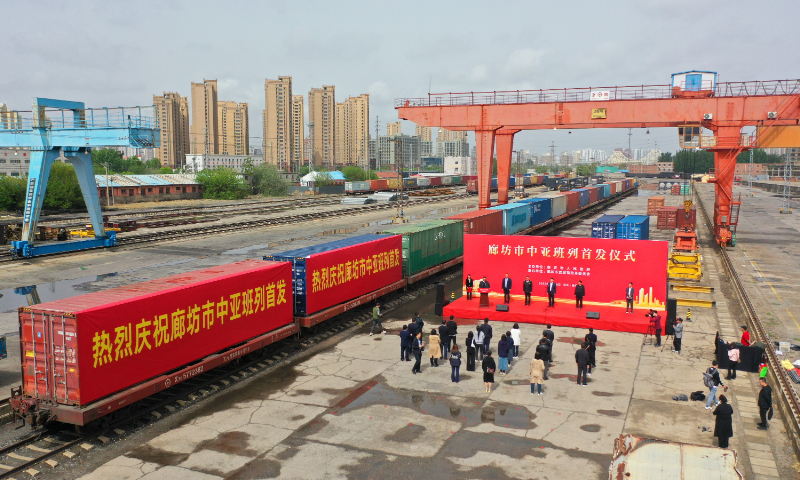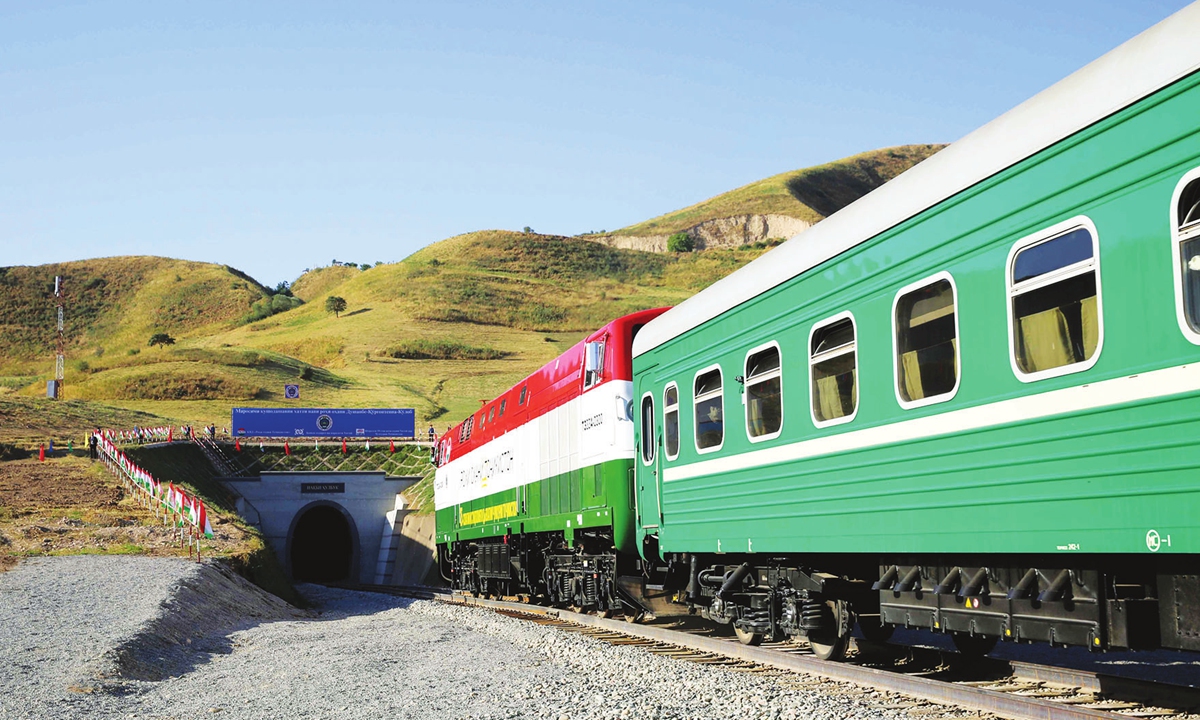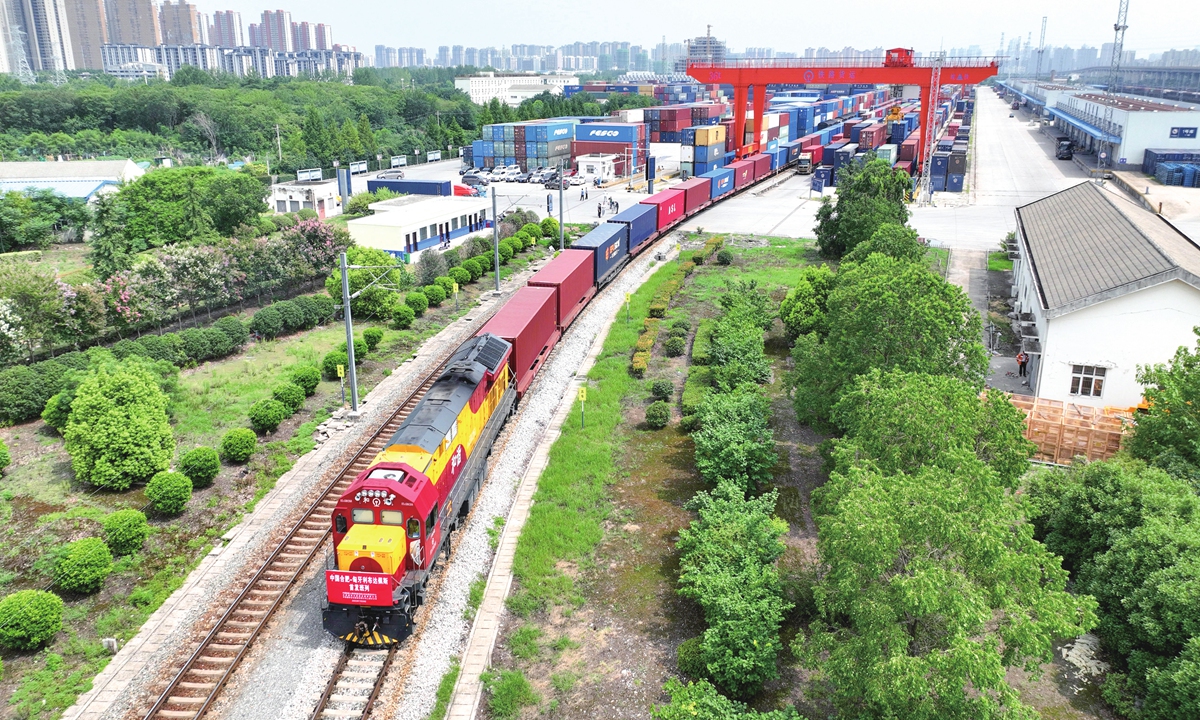China-Uzbekistan partnership enters a new era as presidential visit seals agreements on stronger cooperation, connectivity under BRI

An aerial photo taken on April 28, 2023 shows a freight train heading to Tashkent, capital of Uzbekistan, from Langfang, North China's Hebei Province. This is the first Langfang-Tashkent freight train under the China Europe Railway Express. Photo: VCG
Among all the good wishes for stronger cooperation between China and Uzbekistan, the early construction and launch of the railway project linking China, Kyrgyzstan and Uzbekistan would be a significant achievement for Liu Yu. As the executive chairman of the Uzbek Chamber of Commerce for Chinese Entrepreneurs and an early business pioneer in the Central Asian country, Liu's expectations for closer connectivity between neighboring countries in the region are indescribable.
Liu's wish may soon become a reality, as the commencement of the railway project at an early date was mentioned during the three-day visit of Uzbek President Shavkat Mirziyoyev to China from Tuesday to Thursday.
The project, as part of the China-proposed Belt and Road Initiative (BRI), is expected to enhance both hard and soft connectivity, while helping Uzbekistan further transition from a landlocked country to a land-linked country.
The railway project is just one of many things discussed during the meetings of the two countries' leaders in Beijing. Cooperation across a number of fields was flagged during this special occasion, highlighted by the signing of a series of documents including the Belt and Road cooperation, economic and technological cooperation, connectivity, environmental protection and new energy, as Xinhua News Agency reported, shedding light on a broader and deeper cooperation between Uzbekistan and China, its major trading partner.
Landlocked to land-linked
"I look forward to the early construction and opening of the China-Kyrgyzstan-Uzbekistan railway, which will not only benefit the export of Chinese enterprises but also help Uzbekistan rapidly develop its trade with China," Liu told the Global Times.
In further illustration of the potential of new transport routes, the businessperson said that the proposed rail link passes through a key section of the ancient Silk Road, where camel caravans once facilitated the transportation system and industrial development along the route.
Once completed, the railway will not only establish a southern route for the New Eurasian Continental Bridge but also create a new land-sea corridor, enhancing the overall transportation network of the Asia-Europe continent, he said.
Liu's expectations for enhanced transport connectivity are grounded in the achievements already made in economic and trade activities between the two countries, gradually transforming Uzbekistan from being landlocked to becoming land-linked.
In fact, the Central Asian country has become a hotspot for overseas investment from Chinese companies, and the scale of economic, technological investment, and cooperation between the two countries continues to expand.
Data from Uzbek Chamber of Commerce for Chinese Entrepreneurs suggests that, currently, more than 2,400 Chinese-funded enterprises are involved in investment and business activities in the country, spanning multiple sectors including petroleum, natural gas, rail, telecommunications, agriculture, chemicals, machinery and equipment, the electrical grid, and engineering contracting.
Chinese enterprises have a presence in nearly every major sector in Uzbekistan, Liu said, citing examples such as the construction of Uzbekistan's tallest iconic building by Shanghai Construction Group Co and the successful completion of infrastructure and engineering projects by China Energy Engineering Co, which have significantly contributed to the country's power transmission and security.
Additionally, the launch of China-Europe freight trains has elevated the importance of Central Asian countries, including Uzbekistan, as crucial transportation hubs connecting East and West.
Meanwhile, agricultural products from Uzbekistan and mechanical equipment from China can be delivered efficiently, leading to a substantial increase in quantity to fulfill the needs of people in both countries.
In 2023, bilateral trade stood at 98.85 billion yuan ($13.93 billion), a year-on-year increase of 53.2 percent, data released by the General Administration of Customs showed.
Strengthening trade connectivity has helped the country facilitate its green transformation.
Since entering the Uzbek market in 2012, the Chinese commercial vehicle producer Yutong Bus Co (Yutong) has exported over 1,400 buses to the country, accounting for more than 60 percent of China's exported buses to Uzbekistan.
Based on the regional needs for green transformation, in 2022, Uzbekistan introduced 20 new energy buses from Yutong for the first time. In 2023, as part of Yutong's delivery of 800 buses, there was an order for 300 new energy buses for the capital, Tashkent, the company told the Global Times.
Last year, the firm won a bulk order for new energy buses in Samarkand, the country's second-largest city, making new energy bus orders a new growth point, it said.
"There is strong complementarity in various fields such as new energy products, automobiles, and agriculture… as a landlocked country, Uzbekistan requires more external trade and investments to revitalize its economy, and Chinese enterprises have provided it with opportunities to achieve this goal," Zhang Hong, a research fellow at the Chinese Academy of Social Sciences, told the Global Times.
New era for cooperation
The Uzbek presidential visit marked the commencement of a stronger cooperation as China and Uzbekistan have upgraded bilateral ties to an all-weather comprehensive strategic partnership for a new era. This cooperation is expected to be further integrated for win-win outcomes under the BRI.
As the Uzbek president noted in a signed article in the Global Times on Monday ahead of his visit, "for us, the BRI is not just an infrastructure project. Through the joint implementation of the initiative, the region is becoming an important link in global connectivity, overcoming transport remoteness."
Chinese experts said that under the BRI framework, Uzbekistan embraces stronger connectivity, which lays the solid foundation for the booming trade and investment, thereby bringing vigor to the regional economy.
"Uzbekistan is a populous country and an important economic power in the region. Strengthening interactions with China under the BRI, in the growing complexity of the world situation, has become increasingly important to Uzbekistan today, especially when it comes to helping the country play a greater role in world governance," Zhang said.
Liu also noted that under the guidance of the BRI and the Development Strategy of the New Uzbekistan, China-Uzbekistan economic and trade relations continue to achieve new breakthroughs, with cooperation deepened and solidified in various fields such as politics, economy, science, education, and culture.
Experts are optimistic that in 2024, the China-Kyrgyzstan-Uzbekistan transport corridor, a flagship project for regional cooperation, will gain momentum. Furthermore, there are expectations for increased collaboration between the two countries in areas such as new energy, tourism, and people-to-people exchanges.



